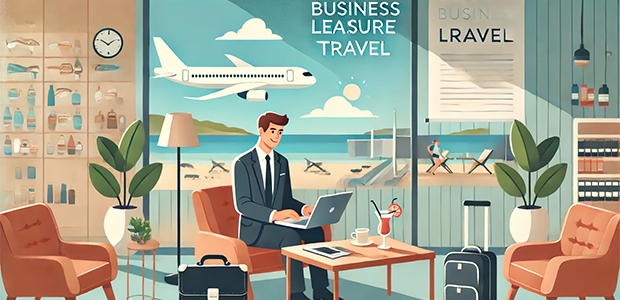
The changing face of SME business travel: ‘bleisure’ and sustainability
Recent economic turbulence, marked by high inflation, has put a huge amount of pressure on SMEs. But despite the challenging environment, some business operations, notably overseas travel, appear to be doing well.
In fact, according to the Global Business Travel Association (GBTA), 83% of travel buyers say their 2023 global business travel bookings increased versus 2022.
This chimes with a recent survey of over 1,000 UK SMEs carried out by Travel Counsellors which found that corporate travel spend in the UK is projected to increase in the next 12 months, with over half (60%) of SMEs planning to spend more on business travel overseas compared to last year. In addition, over a third (37%) of SMEs are planning to take more overseas trips.
Whilst there are likely several reasons behind this trend, one of the biggest is the desire to conduct meetings with clients and customers in person. In fact, according to Travel Counsellors’ survey, face-to-face interactions are perceived to be more beneficial than virtual ones due to enhanced collaboration, stronger customer and client relationships, and increased revenue.
With SMEs expecting to both travel and spend more in the year ahead, what are the key trends expected to take centre-stage and what does this mean for travel companies at large?
The emergence of ‘bleisure’ travel
As the name may suggest, ‘bleisure’ blends business and leisure travel, allowing travellers to extend their stay beyond work obligations. There are two main categories of travellers: those who bring friends or family along with them to share the experience and those who opt to add a few days of vacation to their business trips.
According to Travel Counsellors, ‘bleisure’ is now a key part of SME travel, with nearly half (48%) of respondents extending the length of their business trip with leisure activity at the end. On average, SMEs extend their business trips for leisure purposes by 2.46 days. In addition, more than two fifths bring their partners or family members on an overseas trip, mixing their professional and personal lives while away on business.
The growth of ‘bleisure’ is driven by various factors, most notably the rise in desire for flexible working. In addition, by allowing for some down time at the end of the trip, companies that support ‘bleisure’ travel can offer a unique way to enhance employee satisfaction and wellbeing, in turn boosting overall morale and productivity.
Sustainability: another new mainstay of SME travel
In recent times, sustainable travel has become another mainstay of SME overseas travel, and sustainability is a growing consideration amongst businesses in setting travel policies and purchasing decisions. Over half (57%) of respondents say their business is taking steps to implement more sustainable business travel. These include scheduling multiple meetings in the same trip where possible to reduce the number of flights taken (44%) and booking direct flights instead of multi-leg options to help reduce carbon emissions (40%).
With sustainable travel options rising in demand, travel companies must ensure that businesses have the right tools to make lower carbon choices. Travel Counsellors, for example, provides businesses with carbon estimates at the point of quotation on flights and carbon reports following a trip. In addition, the company’s Green Leaf label displays where hotels have sustainability accreditations that are recognised by the Global Sustainable Tourism Council, helping customers choose more sustainable accommodation options.
The push towards sustainable travel is driven by both corporate responsibility and growing pressure from stakeholders to introduce more environmentally friendly practices. SMEs are recognising that sustainable travel not only benefits the planet but also their reputation and aligns better with their stakeholders’ values.
This, together with the rise of ‘bleisure travel’ puts ever more pressure on travel companies to provide clients with a service that goes beyond duty and into the personal – one that is tailored to specific needs and evolves depending on circumstances. At Travel Counsellors, this type of service – or care – is at the heart of everything it does and is helping it to drive forward new strategies and innovations in its travel programmes.
The rise of both ‘bleisure’ and sustainable travel are not just passing fads but indicative of a broader shift in corporate travel priorities, driven by the changing needs and values of businesses and their employees.

